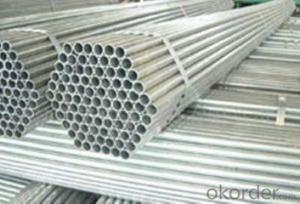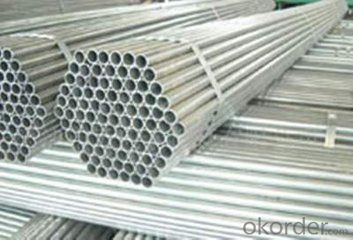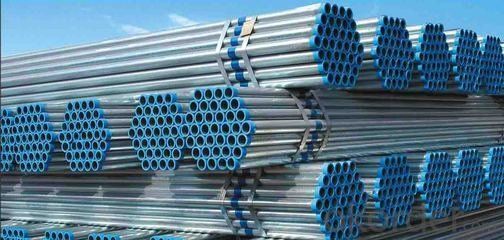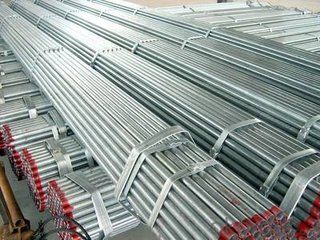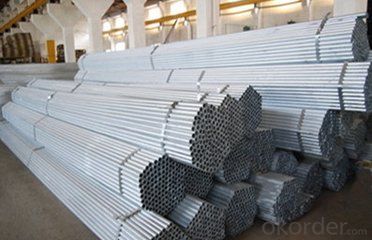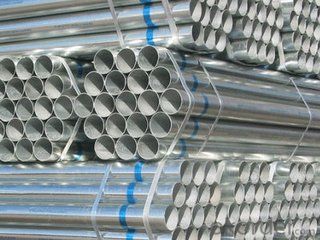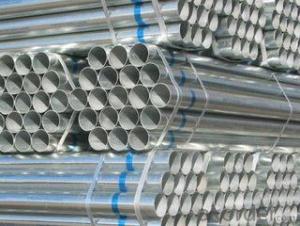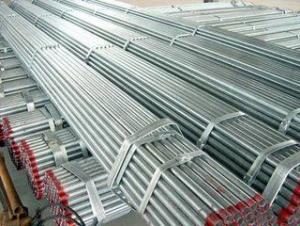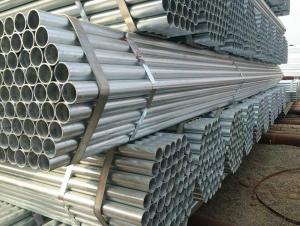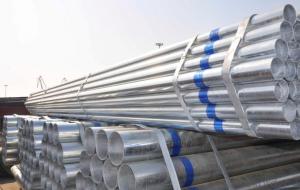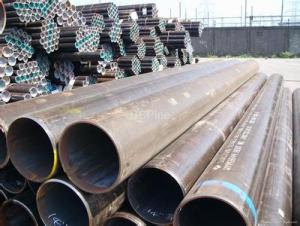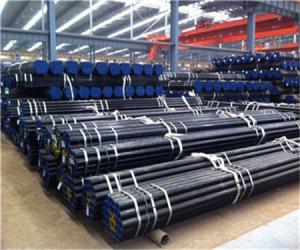2“ HOT-DIP GALVANIZED PIPE FOR FLUID TRANSPORTATION GOOD QUALITY
- Loading Port:
- Tianjin
- Payment Terms:
- TT OR LC
- Min Order Qty:
- 10 m.t.
- Supply Capability:
- 10000 m.t./month
OKorder Service Pledge
OKorder Financial Service
You Might Also Like
Specifications
HOT-DIP GALVANIZED PIPE FOR FLUID TRANSPORTATION
1.OD:33.4-114.3mm
2.WT:2.0-9.0mm
3.Zinc:200~600g/m2
Good serveice
We Offer You:
HOT-DIP GALVANIZED PIPE FOR FLUID TRANSPORTATION
HOT-DIP GALVANIZED PIPE FOR FLUID TRANSPORTATION | |||
1. Material | Steel Grade | Q195, Q235, Q345 etc. | |
Material Type | Available in cold rolled and hot rolled | ||
2. Size | W.T | 1.0mm-12mm | |
Diameter | 20mm~273mm | ||
Length | 5.8m-14m | ||
3. Zinc Coating | 200~600g/m2, could be thicker or thinner if you need | ||
4. Certification | BV, IAF, SGS,COC, ISO etc. | ||
5. Welding Technology | Longitudinal ERW | ||
6. Application | Urban construction, machine structure, agriculture equipment, water and gas pipes etc. | ||
7. Packing | Packing in bundle with steel strips; with seaworthy package at the end; could be done with your requirement. | ||
8. Delivery Time | Usually within 10-30 days after receipt of deposit, ASAP | ||
9. Trade Terms | FOB, CFR, CIF etc. | ||
10. Payment Terms | T/T, L/C etc. | ||
11. Loading Port | Xingang , Tianjin | ||
12. Original Place | Tianjin, China | ||
13. Company Information | Name | Reliance Metal Resource Co., Ltd | |
Type | Manufacture and trading company | ||
Supply Ability | 360,000 tons per year | ||
Galvanized Round Steel Pipe's Materials
| Elements Material | Chemical Compsition% | Mechanical Property | ||||||
| C% | Mn% | S% | P% | Si% | Yield Point (Mpa) | Tensile Strength(Mpa) | Elongation (%) | |
| Q195 | 0.06-0.12 | 0.25-0.50 | <0.050 | <0.045 | <0.030 | >195 | 315-430 | 32-33 |
| Q215 | 0.09-0.15 | 0.25-0.55 | <0.05 | <0.045 | <0.030 | >215 | 335-450 | 26-31 |
| Q235 | 0.12-0.20 | 0.30-0.70 | <0.045 | <0.045 | <0.030 | >235 | 375-500 | 24-26 |
| Q345 | <0.20 | 1.0-1.6 | <0.040 | <0.040 | <0.55 | >345 | 470-630 | 21-22 |
- Q: What are the common applications of steel pipes in the water distribution system?
- Steel pipes are commonly used in water distribution systems for various applications such as transporting water from treatment plants to distribution points, carrying water under high pressure, and providing a durable and long-lasting solution for underground water pipelines.
- Q: How do you prevent steel pipes from rusting?
- To prevent steel pipes from rusting, a common method is to apply a protective coating such as paint or epoxy. Additionally, regularly inspecting and maintaining the pipes, promptly repairing any damage or corrosion, and ensuring proper drainage to prevent moisture buildup are essential preventive measures.
- Q: Are steel pipes suitable for nuclear power plants?
- Yes, steel pipes are suitable for nuclear power plants. Steel is a commonly used material in the construction of nuclear power plants due to its excellent mechanical properties, high strength, and durability. Steel pipes are used in various applications within these plants, including the transportation of cooling water, hot gases, and steam. The steel used in nuclear power plants is carefully selected and tested to meet stringent safety regulations and quality standards. It is crucial for these pipes to have excellent resistance to corrosion and high-temperature environments, as they are exposed to harsh conditions such as high pressure, high temperatures, and radioactive materials. Furthermore, steel pipes have a long service life and require minimal maintenance, making them a cost-effective choice for nuclear power plants. They can withstand extreme conditions, ensuring the safe and reliable operation of the plant. Additionally, steel pipes can be easily fabricated, installed, and repaired, which is essential for the efficient functioning of a nuclear power plant. Overall, steel pipes are highly suitable for nuclear power plants due to their strength, durability, resistance to corrosion, and ability to withstand extreme conditions.
- Q: How are steel pipes used in the pulp and paper industry?
- Steel pipes are commonly used in the pulp and paper industry for various applications such as transporting water, steam, chemicals, and other fluids throughout the production process. They are used in the construction of pipelines, conveying raw materials, and transferring finished products. Steel pipes provide durability, reliability, and resistance to corrosion, making them suitable for handling the harsh conditions and corrosive substances found in the industry.
- Q: What are the common problems or issues faced with steel pipes?
- Common problems or issues faced with steel pipes include corrosion, leakage, cracking, and scaling. Corrosion can occur due to exposure to moisture, chemicals, or environmental factors, leading to reduced structural integrity and potential leaks. Leakage can result from faulty welds, damaged seals, or pipe degradation. Cracking can occur due to excessive stress, temperature fluctuations, or manufacturing defects, compromising the pipe's strength. Scaling or buildup of mineral deposits can also restrict flow and affect performance. Regular inspection, maintenance, and proper coating or lining can help mitigate these issues.
- Q: How are steel pipes used in the manufacturing of appliances?
- Steel pipes are commonly used in the manufacturing of appliances for various purposes such as transporting fluids, gases, and air within the appliance, providing structural support, and acting as conduits for electrical wiring. They are also used for creating ventilation systems and heat transfer mechanisms, ensuring efficient operation and durability of appliances.
- Q: What are the different types of steel pipe fittings for plumbing systems?
- Some common types of steel pipe fittings used in plumbing systems include elbows, tees, unions, couplings, reducers, and caps. Elbows are used to change the direction of the pipe, while tees allow for branching off into multiple directions. Unions are used to join two pipes together, couplings are used to connect two pipes of the same diameter, and reducers are used to connect pipes of different diameters. Caps are used to seal the end of a pipe.
- Q: 20# seamless steel pipe and seamless steel pipe 20G what is the difference?
- The difference is: 20# ordinary steel seamless steel pipe. 20G is the type of steel for high pressure boiler tubes.
- Q: What is the role of steel pipes in the transportation of petroleum products?
- Steel pipes play a crucial role in the transportation of petroleum products. These pipes are specifically designed to withstand the high pressure and extreme temperatures associated with the transportation of oil and gas. One of the main roles of steel pipes in this process is to provide a reliable and secure conduit for the transportation of petroleum products over long distances. They are used to create pipelines that span hundreds or even thousands of miles, connecting oil fields, refineries, and distribution centers. Steel pipes are preferred for this purpose due to their strength, durability, and resistance to corrosion. The high tensile strength of steel allows these pipes to withstand the immense pressure exerted by the petroleum products as they flow through the pipelines. Additionally, steel pipes have the ability to withstand extreme temperatures, ensuring the safe transportation of hot crude oil or refined petroleum products. Furthermore, steel pipes are highly resistant to corrosion, which is a critical factor given the corrosive nature of petroleum products. The pipes are often coated with protective materials, such as epoxy or polyethylene, to further enhance their resistance to corrosion. This helps to prevent leaks or ruptures that could lead to environmental damage or safety hazards. Steel pipes also offer cost-effective and efficient transportation of petroleum products. They have a smooth interior surface, which reduces friction and allows for a more efficient flow of oil or gas. This, in turn, helps to minimize energy consumption and maximize the throughput of the pipeline system. In summary, the role of steel pipes in the transportation of petroleum products is to provide a reliable, secure, and efficient means of transporting oil and gas over long distances. They are designed to withstand high pressure, extreme temperatures, and corrosion, ensuring the safe and efficient delivery of petroleum products from production sites to refineries and distribution centers.
- Q: Can steel pipes be bent or shaped to meet specific requirements?
- Steel pipes have the capability to be bent or shaped in order to fulfill specific requirements. This process, known as pipe bending, requires the use of specialized machinery and techniques to manipulate the pipe into the desired form. There are different methods available, such as hot bending, cold bending, and induction bending, which are chosen depending on factors such as the pipe's size, thickness, required bend radius, and intended application. Industries like construction, oil and gas, automotive, and manufacturing commonly employ pipe bending to create customized pipe configurations that meet specific needs and facilitate efficient installation and functionality.
Send your message to us
2“ HOT-DIP GALVANIZED PIPE FOR FLUID TRANSPORTATION GOOD QUALITY
- Loading Port:
- Tianjin
- Payment Terms:
- TT OR LC
- Min Order Qty:
- 10 m.t.
- Supply Capability:
- 10000 m.t./month
OKorder Service Pledge
OKorder Financial Service
Similar products
Hot products
Hot Searches
Related keywords
